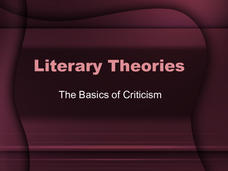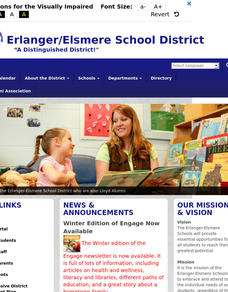Museum of Tolerance
Documents That Shape Society
The Bill of Rights is a foundational document of American democracy, much like the Nuremberg Laws were a foundational document of the Reichstag of Nazi Germany. But that's where their similarities end. Engage high schoolers in a...
Statistics Education Web
Which Hand Rules?
Reaction rates vary between your dominant and nondominant hand ... or do they? Young scholars conduct an experiment collecting data to answer just that. After collecting data, they calculate the p-value to determine if the difference is...
State Bar of Texas
Miranda v. Arizona
You have the right to remain silent—but why? Scholars analyze the nature of what has become known as the Miranda Rights. A short video along with paired group work and discussion opens the issue of the rights of the accused upon arrest....
Education Development Center
Adding Fractions with Unlike Denominators
If the fractions don't have a common denominator, make them have one. Learners first read and analyze a conversation of pupils trying to add 2/5 and 1/2. They compare the process of adding fractions to the process of adding quantities...
EngageNY
Forming a Research-Based Claim: Comparing Cascading Consequences
It's time to weigh the risks and benefits of screen time! Pupils work in triads to identify the strongest positive and negative consequences from their Cascading Consequences chart. Next, using the chart and their researcher's notebooks,...
EngageNY
Choosing a Position: Screen Time and Adolescents
Time to pick a side! Building on the Fishbowl activity from the previous instructional activity, scholars choose a position about whether the American Academy of Pediatrics should raise its screen time recommendations. Using notes,...
Simon & Schuster
Curriculum Guide to: Adventures of Huckleberry Finn by Mark Twain
Five lessons make up a curriculum guide to The Adventures of Huckleberry Finn. Readers find examples of Twain's use of irony, closely examine Huck's colloquial language, as well as his sense of morality, and identify themes in the novel....
Livaudais-Baker English Classroom
Literary Theories
Introduce ELA scholars to the basics of literary criticism with a 41-slide presentation that identifies eight different approaches to critical analysis. Each approach is defined, and advantages and disadvantages are listed. Also included...
Penguin Books
A Teacher's Guide to The Omnivore’s Dilemma: A Natural History of Four Meals by Michael Pollan
"What should we have for dinner?" "What am I eating?" "Where did it come from?" These three questions are at the heart of Michael Pollan's The Omnivore's Dilemma: A Natural History of Four Meals. Pollan's book provides some very...
C3 Teachers
Reparations: Why Are Reparations Controversial?
To understand why the topic of reparations is controversial, young scholars gather background information by reading articles, watching videos, and examining cases where reparations were made. Learners consider the lasting repercussions...
C3 Teachers
Civil Rights: What Made Nonviolent Protest Effective during the Civil Rights Movement?
Sit-ins and boycotts, marches and speeches, songs and demonstrations were hallmarks of nonviolent protest of the civil rights movement. Young scholars research primary and secondary source documents to determine what made nonviolent...
Texas Education Agency (TEA)
Distinguishing Between Inductive and Deductive Reasoning (English III Reading)
Is Sherlock Holmes an inductivist or a deductivist? Users of this interactive to distinguish between inductive and deductive reasoning. They consider in various situations whether it is better to list evidence and then introduce a claim...
Curated OER
Making Decisions by Group: The Jury System
Students discover how to work cooperatively within a group and communicate their ideas clearly in order to reach an agreement. They summarize their experience in writing and hand down a verdict of guilt or innocence based on the...
Curated OER
Welcome to Paradise
Fifth graders listen to Lynne Cherry's novel, The River Ran Wild. They work in two groups one of whom represents the native people and the other represents the English settlers from the book. They look at the geography of the settlement...
Curated OER
Uniform Blues
Fourth graders explore what the U.S. Constitution is and why it is important, the purpose of the state constitution, and its relationship to the U.S. Constitution and the similarities and differences among federal, state and local...
Curated OER
Pine Wood Derby Prompt
Eighth graders use Newton's Laws of Motion to assist a troop in making a winning car in the Pine Wood Derby.
Curated OER
Should We Allow New Mining in the Upper Peninsula?
Students compose an essay taking a position on whether or not a proposed
mine near Marquette, MI should be opened. Students defend their position addressing relevant issues through factual supporting details. Their essay includes an...
Curated OER
Giving a Persuasive Speech
Students explore persuasive speech writing. In this writing lesson, students select a topic for a persuasive speech and take a side on the topic. Students write a persuasive speech and present it to the class.
Curated OER
Lifestyles of the Tribe, or Tomorrowland?
Eighth graders identify with and analyze through writing various Indian cultural values and how they fit in the modern world. Students organize data utilizing Educational software programs and present their opinions and inferences in a...
Curated OER
Slavery
Students, in groups, research primary sources and internet sites about different views on slavery. The groups form as either from the point of view of slave owners or those who want to abolish slavery. They write a written argument for...
Curated OER
John Gary Evans and the Politics of Race
Students read letters written by Evans and Gunton regarding race relations. For this Progressive Movement lesson, students interpret the intentions and tone of the letters to understand contemporary racial beliefs. Students discuss the...
Curated OER
Cornplanter and the Fate of His Land
Students explore Chief Cornplanter and his importance as the leader of the Seneca tribe. In this Chief Cornplanter instructional activity, students examine how the Seneca land was taken over by the right of eminent domain. Students...
Curated OER
Colonial North Carolina
Pupils resarch people and events from a given list. Then based on teacher options, students employ perspectives, an audience, a presentation format, and topic to prepare a two-page document to share with the class. Pupils also prepare...
Curated OER
What's My Point?
Sixth graders move through the process of defining persuasion, identifying persuasive arguments and techniques in writing and evaluating their own use of accurate details. Students also define an author's point of view.
Other popular searches
- Writing an Argument
- Writing a Balanced Argument
- Balanced Argument Writing
- Writing Argument Essays
- Unit on Argument Writing
- Writing Argument
- Environment Argument Writing

























